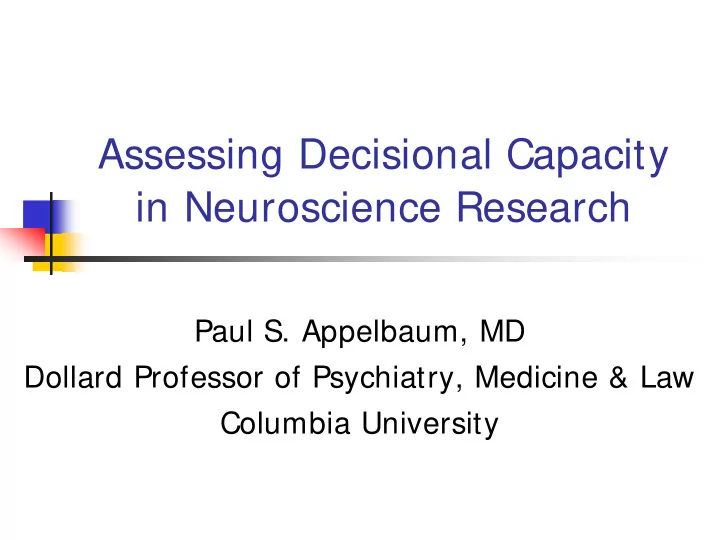

Assessing Decisional Capacity in Neuroscience Research Paul S. Appelbaum, MD Dollard Professor of Psychiatry, Medicine & Law Columbia University
Overarching Principles of Capacity Assessment Potential research participants are entitled to a presumption of capacity Deprivation of decisionmaking power due to impaired capacity involves a significant loss of rights—hence assessments should be done with great care Efforts should be made to ameliorate deficits, when possible, before concluding person is incapable
Need for Individualized Assessment Diagnosis not good predictor of degree of capacity, e.g., Of 90 subjects with severe mental illness, 25% were deemed incompetent by experts (Kim et al., BJP, 2007) Only 47% of 59 patients with mild-moderate AD judged competent by 2/3 psychiatrists (Karlawish et al., AJGP, 2008) Nor are standard assessment tools In 37 patients with mild to moderate AD those scoring ≤19 were unlikely to have capacity, whereas those scoring ≥26 were highly likely to be competent—but MMSE not helpful in intermediate range (Kim & Caine, Psychiatr Serv, 2002)
Approaches to Assessing Impaired Capacity Screening increasingly prevalent in studies of higher risk (e.g., DBS) or with more impaired participants (e.g., schizophrenia) Can be done with: Clinical interview—but reliability a problem and impairment underestimated (Marson et al., JAGS, 2000; Raymont et al., Lancet, 2004) Symptom measures (e.g., MMSE, BPRS)—but poorly predictive Competence screening instruments (Dunn et al., 2006)
Assessment Tools Based on Elements of Decisional Capacity Evidencing a choice Does the person have the ability to express a stable choice about research participation? Understanding disclosure of information Does the person understand the disclosed information about the nature of the research project, procedures, risks/benefits, alternatives?
Elements of Decisional Capacity - 2 Appreciation of the nature of the situation and its consequences Does the person have the ability to appreciate the effects of a decision about research participation on his/her own situation? Reasoning (ability to weigh risks and benefits) Does the person have the ability to compare alternative options in light of their risks and benefits? (Appelbaum & Roth, 1982)
Assessment Tools – MacCAT-CR Most widely used — > 50 published studies Assesses understanding, appreciation, reasoning, and choice Series of disclosures followed by questions and reasoning tasks Takes approximately 15-20 minutes Provides quantitative scores, but not competent/ incompetent decision (Appelbaum & Grisso, 2001)
MacCAT-CR Understanding MacCAT-CR Disclosure U-1 (ii) Disclosure (Procedures of Project)— Patients who agree to be in this study will do the following things: - First, they will stop all medications for schizophrenia for 2 weeks; this is called the washout period - Second, after the washout period, they will receive either the new medication or the old medication for 8 weeks; this is called the treatment phase of the study - Altogether, the study lasts 10 weeks; 2-week washout and an 8-week treatment phase
MacCAT-CR Understanding MacCAT-CR Questions “Do you have any questions about what I just said?” “Can you tell me your understanding of what I just said?” If subject fails to mention spontaneously, ask “How long will the research study last?” “What will happen to your medication at the beginning of the study?” “ What medication will your receive in the study?”
Understanding - Scoring 2 Subject recalls content of item and offers fairly clear version. 1 Subject shows some recollection of item content, but describes in a way that renders understanding uncertain, even after efforts to clarify 0 Subject does not recall, is clearly inaccurate, or seriously distorts meaning
Assessment Tool - UBACC 10-item scale—5 mins. to adminster Inquires about understanding, appreciation, and reasoning Good interrater reliability Moderate (0.3-0.5) item correlations with MacCAT-CR subscales 9 published studies (Jeste et al., AGP, 2007)
UBACC Sample Questions Understanding: What is the purpose of the study that was just described to you? Appreciation: Do you believe this is primarily research or primarily treatment? Reasoning: What makes you want to consider participating in this study? Scoring: 0-2
Use of Screening Instruments Thresholds can be set based on data from similar populations or a priori judgments Degree of capacity required will vary depending on study’s complexity and risk Failure can trigger clinical evaluation and/or remediation Retesting after remediation allows participation for those able to improve performance But investigator should be permitted to exclude even subjects who pass the screen
Who Should Do the Screening? NBAC (1999) suggested independent evaluation—but that carries costs in time and money Use of objective measures may allow clear documentation of decisions and obviate the need for outside assessor
Conclusions Neuropsychiatric illness may lead to decisional impairment, but is neither a necessary nor sufficient condition for incapacity Screening for incapacity can be done reliably and validly, with acceptable cost Desire to protect incapable subjects must be balanced against interest in allowing people to make their own decisions whenever possible
References - 1 Appelbaum PS, Grisso T: The MacArthur Competence Assessment Tool for Clinical Research (MacCAT-CR). Sarasota, FL: Professional Resource Press; 2001. Appelbaum PS, Roth LH. Competency to consent to research: a psychiatric overview. Arch Gen Psychiatry 1982;39:951-8. Dunn LB, Nowrangi MA, Palmer BW, et al. Assessing decisional capacity for clinical research or treatment: a review of instruments. Am J Psychiatry 2006;163:1323-34. Jeste DV, Palmer BW, Appelbaum PS, et al. A new brief instrument for assessing decisional capacity for clinical research. Arch Gen Psychiatry 2007;64:966-74.
References - 2 Karlawish J, Kim SYH, Knopman D, et al.: Interpreting the clinical significance of capacity scores for informed consent in Alzheimer disease clinical trials. Am J Geriatr Psychiatry 2008;16:568–74. Kim SYH, Appelbaum PS, Swan J, et al. Determining when impairment constitutes incapacity for informed consent in schizophrenia research. Brit J Psychiatry 2007;191:38-43. Kim SYH, Caine ED: Utility and limits of the Mini Mental State Examination in evaluating consent capacity in Alzheimer’s disease. Psychiatr Serv 2002;53:1322–24.
References - 3 Marson DC, Earnst KS, Jamil F, et al. Consistency of physicians’ legal standards and personal judgments of competency in patients with Alzheimer’s disease. J Am Geriatr Soc 2000;48:911–8. Raymont V, Bingley W, Buchanan A, et al.: The prevalence and associations of mental incapacity in medical inpatients. Lancet 2004;364:1421–27.
Recommend
More recommend